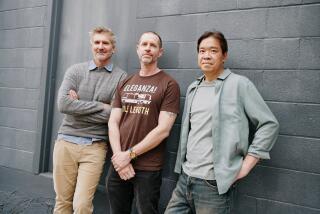MUSIC REVIEW : Peabody Trio Probes Sheng Work
- Share via
Infusions of new repertory remain the continuing need for the piano trio, a not-endangered species of the chamber-music realm. Accomplished ensembles exist in numbers, it seems; fascinating programs are in shorter supply.
Bright Sheng’s Four Movements for Piano Trio (1990), introduced Monday night by the splendid Peabody Trio on the Gold Medal Chamber Music Series at Ambassador Auditorium, is just such an infusion.
A brief, pithy and provocative piece, it uses many resources of the piano, violin and cello combination, sometimes in unorthodox ways, toward the highest expressive ends. At the conclusion of these eventful 12 minutes, one felt that this tight musical essay had touched bases, described emotions and come satisfyingly to a stopping place.
The Shanghai-born, New York-trained Sheng uses conventional devices--folk-like melodies, ethnic scales, imitation of native instruments--with great skill and imagination, creating a soundscape of effective communication. At this first local hearing, the ensemble for which the piece was written gave it as intense and probing a performance as it seems to deserve.
Surrounding the new work, the trio from the Peabody Institute in Baltimore--violinist Violaine Melancon, cellist Bonnie Thron and pianist Seth Knopp--gave handsome, full-throated performances of Haydn’s Trio in A, Hob. XV:9, and Dvorak’s Trio in B-flat, Opus 21.
More successful because more concentrated, was the players’ thoughtfully paced, highly polished reading of the Haydn work, which invites instrumental detailing of the kind in which this well-matched trio seems to specialize.
A lesser specificity in the areas of dynamics and emotion marked their playing of Dvorak’s lengthy B-flat Trio. Deeper contrasts and more projected passion would have made it seem shorter.
More to Read
The biggest entertainment stories
Get our big stories about Hollywood, film, television, music, arts, culture and more right in your inbox as soon as they publish.
You may occasionally receive promotional content from the Los Angeles Times.










